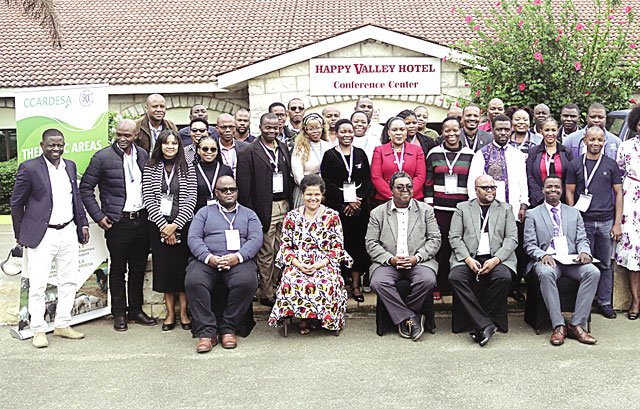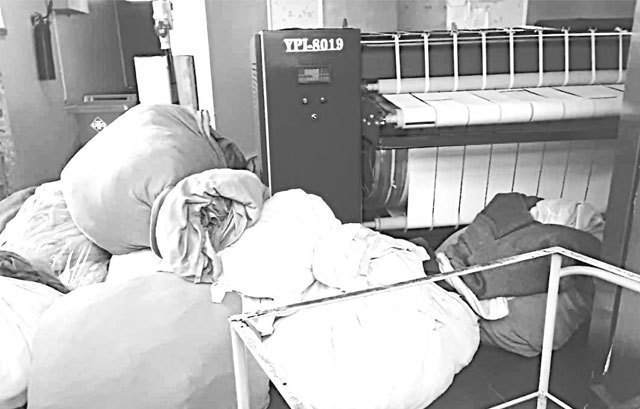By Bodwa Mbingo | 2018-04-21
Having celebrated 50 years of independence on Thursday, the country has requested divine intervention into the recovery of Eswatini land lost during the colonial era, both on the east and south of the country.
Bishop Stephen Masilela, when opening the 50/50 national celebrations with prayer at the Mavuso sports centre on Thursday, made sure that he does leave the intervention of God in the country’s desire to regain its lost land to both South Africa and Mozambique.
“…Nalelive lesamukwa lona litawubuya. God bless Swaziland as we celebrate 50/50…,” prayed the Bishop when prophesying that with God’s intervention, the lost land would be returned to its rightful owners – the people of Eswatini.
In March 2017, the Border Determination Committee headed by Prince Guduza revealed in their first ever media engagement with the country's editors where the soon to be launched Pan-Swasism programme was announced that some specific parts of South Africa and Mozambique actually belong to Swaziland.
The committee placed its cards on the table and revealed that its mandate as directed by the King is to recover all the Swazi land lost during the colonial era, both on the east and south which gives us access to the Indian Ocean, including the west and north which goes as far as Pretoria and Limpopo Province.
This is where it was declared that South Africa’s administrative capital of Pretoria and larger portions of the Gauteng, Limpompo and KwaZulu- Natal Provinces belong to the Swazi nation.
It is noteworthy that the Border Determination Special Committee (BDSC) restated the country’s land claim at a time when the ruling party in South Africa, the African National Congress (ANC) backed by the Economic Freedom Fighters (EFF) was talking about the expropriation of land from the whites without compensation. It emerged that those whites who own vast tracks of land were given concession agreements by Swazi Kings.
According to the committee’s assertion, the above is not the only land that belongs to Swazis, but the country’s original demarcation starts from as far as up the Limpopo River that now separates South Africa and Zimbabwe in South Africa’s Limpopo Province and the Mkhuze River in KwaZulu-Natal, which in essence should give currently landlocked Swaziland an access to the Indian Ocean.
Displaying the initial boundaries before the colonial era, an eloquent and confident Prince Sicelo, who is a member of the committee, at the time highlighted that Swazis have existed since time immemorial and revealed that they were amongst the continent’s ancient nationals.
“The initial boundaries of the country show that the country was demarcated by the Limpopo River on the north and the Mkhuze River in the South. Even modern day Pretoria belongs to Swaziland and the then Sophiatown (in the Gauteng Province) was inhabited by Swaziland.
Our history is intact and we can show that King Ngwane III was the first to cross the Lubombo Mountains, which gives us claim to some land within modern day Mozambique.
By then the notable neighbours to the Swazis were the Ndwandwes and, therefore, places such as Piet Retief and KaNdinda were inhabited by Swazis,” he added.
He said during the time of King Somhlolo, Swazis moved up to the then Transvaal as a result of the Umfencane wars that were started by King Shaka of the Zulu and King Zwide.
He said they found Pedis there whom they pushed up north, hence even today there were proud Swazis who spoke Siswati in Limpopo.
Legal eagle, Thabiso Masina, who is the committee’s ex-officio member from the Attorney General (AG)’s office disclosed that South Africans have acknowledged that Swaziland was bigger in the 1840s than it is now and even before the white settlers came to the continent and region.
He explained that land was lost to the Swazis as a result of concessions to the white settlers around the 1840s and after some time things changed as it was claimed that the Swazis had sold such land to the settlers.
He argued that even if the land had been sold, but there was never a signature of the sitting King to show that he had given away such land, which shows that arguments that Swazis do not own the land in question are vague and unfounded.
share story
Post Your Comments Below

Eswatini along with many other African nations is under scrutiny for failing to meet its commitme...

While things are falling apart at the Pigg’s Peak Government Hospital, the ministry of heal...

BEAUTY Pageant Eswatini Chairman, Sandra Ismail, officially passed over the Miss Eswatini title t...

Status Capital Building Society shareholders are once again being asked to take part in an audaci...
All material © Swazi Observer. Material may not be published or reproduced in any form without prior written permission.
Design by Real Image Internet